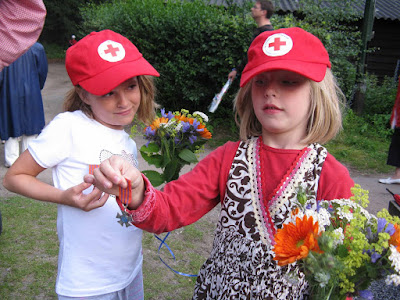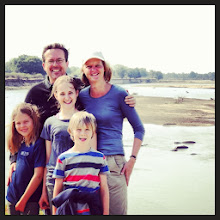
We settled in Dakar in 1999 when the country prepared presidential elections that were held in 2000 and which saw the end of 40 years socialist reign and 20 years of Abdou Diouf presidency. At that time we lived in Point E, just opposite the house of Abdoulaye Wade, the most prominent opposition leader who would be elected president in 2000. Every evening we witnessed the large gatherings in front of his house and the spirit of change (sopi) was really in the air. People and especially youth were extremely hopeful about this change and expectations were high about Wade’s capacity to tackle high unemployment rates in particular. We observed something really special happening in this country, and this positive ambiance (le Sénégal qui gagne) lasted until the 2002 world soccer championship in Korea/ Japan when, very symbolically, Senegal surprised everybody by going to the quarterfinals.
Now we are in 2008 and we have to admit that we leave Senegal at a time when the situation is deteriorating in several respects. Politically : all elections held since 2002 have been heavily contested, Constitution changed at least 20 times, the turnover rate of Ministers and Prime Ministers is very high, power has been progressively centralised at the Presidency, and the impartiality of Justice is not always as clear as one would expect. Economically : economic growth rates decline, as a result of ambitious public spending on what many consider as non priority issues – public finance is in bad shape, disparities between rich and poor increase, and despite the prevailing discourse, Senegal is not able to attract foreign investment in sectors which benefit employment. Socially: many families still confront the daily difficulty of making ends meet, many families depend largely on migrant remittances, criminality is on the rise in urban areas especially, and unemployment remains high.
In addition, just as many other countries Senegal has had to deal with sharp increases in food prices (rice in particular). In combination with two years of disastrous harvests this has resulted in social tension. The deficit in local food production is as much the result of shortage and unpredictability of rainfall as of the absence of agricultural policy. Today, in many parts of rural Senegal, those families that cannot benefit of any form of social solidarity at family or community level are forced to reduce food consumption and eat only one meal a day. The situation is expected to get worse because the traditional food deficit season (just before the next harvest) has only to start. In order to maintain an image of emerging country (le Sénégal qui gagne) Government is reluctant to admit that the situation is alarming. Unfortunately, it is.
To us, Senegal will always remain a beautiful, fascinating and diverse country with a rich cultural heritage and a highly creative and innovative population very much attached to its traditions. A country with a religious capital (Touba) which keeps its status of village but which today has a population of over a million. A country which has so fascinatingly mixed religion (Islam) and tradition, religion and politics, religion and economy. A country, which has a Diaspora on each continent and which at the same time is a destination for many African attracted by the traditional Islamic brotherhoods in the country.
Yet, it also remains a country of contradictions and contrasts. The fast-going and rich urban cultural life of downtown Dakar compared to life in other parts of the country. The extent to which people are global citizens (Senegalese migrants can be found everywhere in the world and they continuously seek new destinations) compared to the importance they attach to their own customs and traditions (there is nothing better than rice and fish, ceebu jën). The extent to which Government is contested and criticised by certain categories of the population (press, teachers, formally employed middle class, intellectuals, etc.) compared to the rate at which president Wade was re-elected last year (even when fraud is accounted for). The innovativeness and richness of local and community initiatives compared to the far from successful implementation of Government policies to create conditions under which these initiatives could flourish. The invitation for 100 people to assist the signing of the president’s new biography in Paris compared to almost continuous strikes in the education sector as a result of which children have not learned much this school year.

 En dan gaan we voor het eerst met de kinderen kamperen. Daar we niet meteen in camping spullen wilden investeren, huurden we een ingerichte tent op een camping in Frankrijk. Het blijkt een hele kleine sympathieke camping te zijn gerund door een Nederlandse familie. Dit is de eerste zomer dat ze open zijn. Het is een zeer luxe vorm van kamperen met een koelkast en zachte matrassen. De kinderen vinden het het einde! Op de camping is een trampoline, een grote zandbak en er zijn cavia's. Op de camping hebben we afgesproken met Bart en Anouka, goede vrienden uit Senegal en zeer ervaren campeerders. Dit is echt vakantie!
En dan gaan we voor het eerst met de kinderen kamperen. Daar we niet meteen in camping spullen wilden investeren, huurden we een ingerichte tent op een camping in Frankrijk. Het blijkt een hele kleine sympathieke camping te zijn gerund door een Nederlandse familie. Dit is de eerste zomer dat ze open zijn. Het is een zeer luxe vorm van kamperen met een koelkast en zachte matrassen. De kinderen vinden het het einde! Op de camping is een trampoline, een grote zandbak en er zijn cavia's. Op de camping hebben we afgesproken met Bart en Anouka, goede vrienden uit Senegal en zeer ervaren campeerders. Dit is echt vakantie! 
 En dan gaan we voor het eerst met de kinderen kamperen. Daar we niet meteen in camping spullen wilden investeren, huurden we een ingerichte tent op een camping in Frankrijk. Het blijkt een hele kleine sympathieke camping te zijn gerund door een Nederlandse familie. Dit is de eerste zomer dat ze open zijn. Het is een zeer luxe vorm van kamperen met een koelkast en zachte matrassen. De kinderen vinden het het einde! Op de camping is een trampoline, een grote zandbak en er zijn cavia's. Op de camping hebben we afgesproken met Bart en Anouka, goede vrienden uit Senegal en zeer ervaren campeerders. Dit is echt vakantie!
En dan gaan we voor het eerst met de kinderen kamperen. Daar we niet meteen in camping spullen wilden investeren, huurden we een ingerichte tent op een camping in Frankrijk. Het blijkt een hele kleine sympathieke camping te zijn gerund door een Nederlandse familie. Dit is de eerste zomer dat ze open zijn. Het is een zeer luxe vorm van kamperen met een koelkast en zachte matrassen. De kinderen vinden het het einde! Op de camping is een trampoline, een grote zandbak en er zijn cavia's. Op de camping hebben we afgesproken met Bart en Anouka, goede vrienden uit Senegal en zeer ervaren campeerders. Dit is echt vakantie! 







